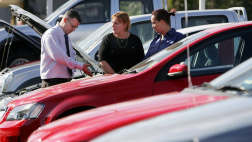The car industry uses a web of alliances to survive.
Lust, affairs, one-night stands, engagements, marriages and divorces — it can be hard sharing your love. It can also be expensive, especially if the human analogy is applied to the car business.
DaimlerChrysler's recent divorce cost the now-solo Daimler AG a cool $33 billion.
Daimler and its former partner, now known by her maiden name of Chrysler Group, still share the kids.
These include shared components and manufacturing, including the Chrysler Crossfire (based on the previous Mercedes-Benz SLK) and Jeep Grand Cherokee, which uses Mercedes' V6 diesel engine and transmission.
Daimler-Benz and Chrysler courted in the late 1990s, sealing their association in 1998 with a new name, DaimlerChrysler.
The marriage was mutually beneficial. Daimler gained economies of scale and a new customer for engines, transmissions and an outlet for its old platforms. The previous Mercedes E-Class shares the same platform as the Chrysler 300C.
Chrysler gained unprecedented, cost-effective access to the drivetrains used to power its distinctively styled cars.
Of the divorce, shareholders of Daimler- Chrysler spitefully said “I knew it wouldn't work”.
Marriages may be difficult, but alliances are what keep many car companies afloat.
All these inter-relationships are spurred by one goal — profit. So competitive is the car industry that every dollar counts.
Making cars cheaper improves profits, even if that means relocating factories to countries with low labour costs, non-existent unions and tax-free government incentives.
Few would know that 10 models on the Australian market are made in Thailand. South Africa makes five, there's one from the Czech Republic, three from Slovakia, one from Poland, four from Malaysia and one from Indonesia.
Build quality in most cases is as good as you'd expect from a country-of-origin factory.
The biggest difference is manufacturing costs. Building a Volkswagen Golf in Germany, for example, costs substantially more than building the same car in South Africa. Sharing components such as engines, transmissions, platforms and bodies with a rival company — or at least one perceived as being a rival — is big business.
The platform of the Mazda3 is similar to the Volvo S40 and Ford Focus. Ford has a big chunk of Mazda's shares and owns Volvo outright.
The Toyota Aygo, a one-litre hatch soon to be sold in Australia, is built in the Czech Republic with the Citroen C1 and Peugeot 107. The only differences are interior trim, grilles, head and tail lights. Everything else, except the badge, is identical.
General Motors has a giant web of ownership, component sharing and minor shareholdings. It owns Saab and Hummer, and rebadges cars including the Daewoo Matiz as Chevrolets.
GM owned 20 per cent of Fiat until it dissolved the relationship in 2005. But retains component sharing deals and owns 50 per cent of Fiat's JTD diesel engine technology.
GM also has 3 per cent of Suzuki (it had 20 per cent until selling down in March 2006) and 7.9 per cent of Isuzu.
This relationship crosses with Fiat. Suzuki buys Fiat diesel engines for its European cars but also buys diesels from the PSA group (owner of Peugeot and Citroen) and Renault. Fiat this year will also supply diesel engine's to Saab.
The Suzuki Splash, to be launched in Europe later this year is based on the Swift/SX4 platform, but will be rebadged the Opel/Vauxhall Agila for European sales.
Fiat sells the Suzuki SX4 as the Sedici in Europe.
Suzuki also owns 11 per cent of GM-DAT, the Korean-based company that makes the Holden Epica, Captiva, Viva and Barina.
GM sold its 20 per cent of Subaru parent, Fuji Heavy Industries, in 2005. Fuji bought back most of the shares, though Toyota bought in and now owns 8.7 per cent of the company.
Toyota also owns Daihatsu and has a big stake in Yamaha. Yamaha has an engineering alliance with Toyota — twin-cam engine and multi-valve heads included — and recently created the V8 engine for Ford-owned Volvo.
GM also gets its Saab plant in Sweden to make the Cadillac BLS mid-size car, alongside its Saab 9-3 and 9-5.
The Hyundai Sonata's 2.4-litre engine is shared with the Jeep Compass, Dodge Caliber, Chrysler Sebring and Mitsubishi Outlander.
Renault has an alliance with Nissan and owns Samsung (Korea) and has a joint venture with Mahindra (India).
Porsche's Cayenne SUV is built in Volkswagen's factory in Slovakia alongside the Volkswagen Touareg and Audi Q7. Porsche's Cayman is built in Finland. That's just the tip of iceberg.
Peyton Place has nothing on these guys.





.jpg)


.jpg)
.jpg)
.jpg)

.jpg)

.jpg)





.jpg)
.jpg)

.jpg)
.jpg)
.jpg)



.jpg)